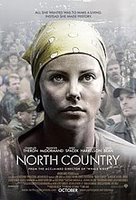NORTH COUNTRY
 Director: Niki Caro (Whale Rider)
Director: Niki Caro (Whale Rider)Starring: Chalize Theron, Frances McDormand, Sean Bean, Woody Harrelson
Niki Caro’s follow up to the delightful Whale Rider, North Country is the story of a landmark sexual harassment case in the taconite mines of northern Minnesota. The film starts off quite strong, and maintains this quality for most of its length. Very unfortunately, it ends with a whimper, but more on that later.
It’s the middle of a cold winter in the 1980s, during the macho Ronald Reagan administration. Anita Hill is on the TV accusing Clarence Thomas of sexual harassment. Charlize Theron plays a young single mother struggling to feed her children and to maintain any meaningful relationships with those around her in the small town she was born in. Eventually, she is convinced by a trailblazing female friend (Frances McDormand) to join her in the union work force at the local iron mine. Needless to say there are very few women in this kind of work. The movie tells us that it’s a 30 to 1 male to female ratio.
The men don’t want the women there. The union doesn’t want the women there. The managers don’t want the women there. Eventually we find out the owners don’t want the women there, either. This is “man’s work” and every women hired is a job lost for a man in the small town. Often when sexual harassment is discussed in the media, the implication is usually that it’s little more than a ‘come on’ that the woman didn’t want. That may be so in some cases. The sexual harassment at this mine, however, was astoundingly offensive (at least in the story told on screen). All of the women suffered, but the young, pretty and weaker ones were the most targeted. We see the harassment as more than just male hormones gone awry. It took on the form of violent bullying. If rape didn’t occur, it was always a threat hanging in the air. The women knew who the bosses were in this little playground.
The women were caught in an awful catch 22. They desperately needed the job to feed their families, but the job was nonetheless terrifying and horrible for them. Eventually the circumstances become so heated that Charlize quits and sues the company. At first the other women are too fearful of losing their jobs, or of what would happen to them if they lost the case, that they would rather join in in hiding the harassment. As can be expected, the women, and Charlize’s father, do eventually gather their moral courage and support the case.
This courtroom climax is where the film breaks down unfortunately. Instead of continuing the compelling story of the workplace harassment, it attempts to impose an awkward twist on the plot (which I won’t divulge). Much worse than this, however, the script as a whole loses its gravitas and falls headlong into cheesy melodrama. Eighty percent of this movie was gripping, very well acted, and quality filmmaking. The final scenes leave a bad taste in the mouth, though. Despite this, I can rate the film fairly well. It is a subject and story that should be seen. Theron deserves award consideration for her fine performance. I would also like to applaud Sissy Spacek. Virtually every time I see her on screen, she has the most real, most fleshed-out character in the story. She has a small role as Theron’s mother in this film, but she was wonderful in it.
Standouts: A wonderfully acted, well-done film, with an enraging, engrossing story for most of its length.
Blowouts: The cheesy courtroom ending.
Grade: B+
12/30/2005

0 Comments:
Post a Comment
<< Home